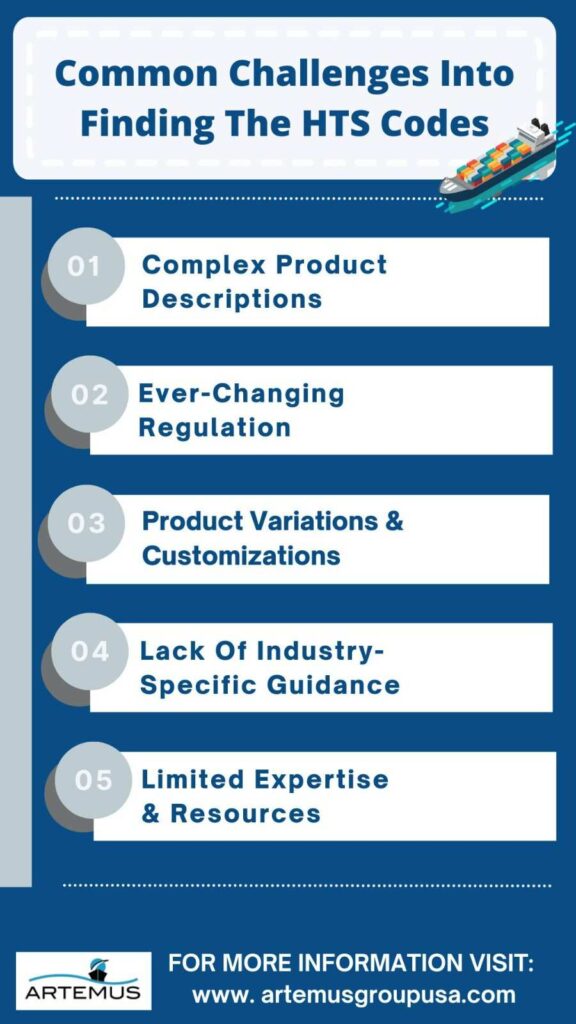
What Is Inbound Logistics & Outbound Logistics? A 2025 Guide
In the dynamic world of supply chain management, understanding the nuances of inbound and outbound logistics is crucial for operational

Navigating the complex world of international trade requires a keen understanding of the Harmonized Tariff Schedule (HTS) codes, crucial for accurate customs declarations. If you’ve ever wondered how to find the right HTS code for your products, you’re not alone.
In this blog, we’ll guide you through the process, offering insights into the importance of HTS codes, how they impact customs duties, and the strategies to determine the most fitting code for your goods.
When it comes to international trade compliance, one essential aspect is the accurate and timely filing of the ISF & AMS. Artemus Transportation Solutions provides cutting-edge ISF filing software & AMS filing software designed to streamline your compliance journey.
Table Of Contents
An HTS (Harmonized Tariff Schedule) code is a 10-digit classification number used by the United States to categorize imported goods and determine applicable customs duties. The first six digits align with the international Harmonized System (HS) code, while the remaining four digits are U.S.-specific for further product classification.
HTS codes are essential for ensuring accurate import documentation, calculating tariffs, and complying with U.S. Customs regulations. Proper classification with the correct HTS code helps avoid shipment delays, penalties, and incorrect duty assessments. The U.S. International Trade Commission (USITC) provides an official online tool to help businesses find the correct HTS code for their products.
To accurately classify imported goods and determine applicable tariffs, it’s essential to identify the correct Harmonized Tariff Schedule (HTS) code. Here are the steps to locate HTS codes:
Accurately identifying HTS codes is vital for compliance and to avoid potential penalties. Utilizing these resources can streamline the process and ensure proper classification.
HTS (Harmonized Tariff Schedule) codes are required whenever goods are imported into the United States. They must be used in customs documentation to determine the correct tariff rates, duty fees, and regulatory requirements. Importers, customs brokers, and freight forwarders rely on HTS codes to ensure compliance with U.S. trade laws and avoid penalties.
HTS codes should also be used when filing Importer Security Filings (ISF), customs entry paperwork, and trade compliance reports. Additionally, businesses dealing with international trade use HTS codes to assess costs, classify products accurately, and facilitate seamless customs clearance. Proper usage of HTS codes ensures smooth import operations and prevents shipment delays.
Related: HS Code VS HTS Code: 10 Differences You Need To Know
Navigating the world of international trade involves decoding the Harmonized System (HTS) codes, which are essential for customs and tariff procedures. Here’s a step-by-step guide on how to find the right HTS code for your products:
Start by checking the official customs website of the country involved in the trade. These websites typically provide searchable databases or tools for HTS code lookup.
For U.S. trade, the USITC website offers the Harmonized Tariff Schedule. Use its search or browse functions to locate the HTS code for your specific product.
Explore online databases that compile HTS code information. Websites like the World Customs Organization (WCO) or trade platforms often offer searchable databases based on product descriptions.
Customs brokers are experts in international shipping. Seek their assistance to determine the accurate HTS code for your products, leveraging their knowledge of trade regulations.
Industry-specific associations provide valuable resources. Contact them for guidance on HTS codes relevant to your sector, ensuring alignment with industry standards.
Related: ISF Filing: A Compliance-Related Guide & Software Solution

Unraveling the world of HTS (Harmonized System) codes in international trade can be akin to navigating a complex labyrinth. Despite their crucial role, challenges abound in the process of finding the right codes. Here are five common hurdles encountered when seeking HTS codes:
1. Complex Product Descriptions: Many products have intricate and detailed descriptions, making it challenging to pinpoint the specific characteristics crucial for HTS code determination. Deciphering these complexities accurately is often a stumbling block for businesses.
2. Ever-Changing Regulations: International trade regulations and tariff schedules are subject to frequent updates. Keeping abreast of these changes requires constant vigilance, and overlooking updates can lead to the use of outdated HTS codes, resulting in compliance issues.
3. Product Variations & Customizations: Products with various models, versions, or customizations may fall under different HTS codes. Determining the most appropriate code for a specific variant becomes a challenge, as nuances in features can significantly impact the classification.
4. Lack Of Industry-Specific Guidance: Some industries lack clear and specific guidance on HTS codes, leading businesses to struggle with classification. The absence of industry-standard codes can result in varied interpretations and inconsistent classifications.
5. Limited Expertise & Resources: Small and medium-sized enterprises, in particular, may lack in-house expertise or resources dedicated to understanding HTS codes. This can hinder their ability to accurately classify products, leading to potential customs delays or compliance issues.
Related: ISF 5: Meaning, Compliance Requirements, & Best Practices
Accurate Harmonized Tariff Schedule (HTS) codes are crucial for international trade. Incorrect codes can lead to severe legal consequences. Here are 10 key points outlining the legal implications:
Related: ISF Fees (Import Security Filing): When & How To Pay?
Artemus offers industry-leading software solutions for ISF (Importer Security Filing), AMS (Automated Manifest System), and AES (Automated Export System) filings, ensuring seamless compliance with U.S. Customs regulations.
Designed for individuals, importers, exporters, customs brokers, NVOCC, & others Artemus’ intuitive platform simplifies the complexities of global trade documentation. From submitting timely and accurate ISF and AMS filings to managing AES export requirements, Artemus ensures your shipments meet all regulatory standards, reducing the risk of delays and penalties.
With a focus on efficiency and reliability, Artemus’s software enhances operational accuracy, automates filing processes, and provides real-time status updates. Whether you’re handling bulk shipments or managing intricate logistics, Artemus empowers you with comprehensive tools and expert support to stay compliant and streamline your customs processes.
Related: How To Check ISF Filing Status? A Step-By-Step Guide
The HTS code is provided by customs authorities in each country.
The HTS code is determined based on the classification rules outlined in the Harmonized System, considering the nature, composition, and intended use of the imported/exported goods.
No, Harmonized System (HS) codes are not country-specific; they are standardized codes used internationally for classifying products in customs declarations.
You can find the HTS (Harmonized Tariff Schedule) code on the official website of the U.S. International Trade Commission (USITC) or by consulting with customs brokers or trade professionals.
Identify the product’s description and characteristics, then refer to the World Customs Organization’s (WCO) Harmonized System or your country’s customs website to find the HS code.
The HTS code is a 10-digit classification number used in the U.S. to determine import duties and categorize products for customs purposes.
No, HTS (Harmonized Tariff Schedule) is used mainly in the U.S., while HSN (Harmonized System of Nomenclature) is an international system used globally for product classification.
You can get your HS code by referring to your country’s customs website, using online lookup tools, or consulting with customs brokers.
The easiest way is to use an online HS code lookup tool by entering your product description or consult with customs experts.
Check your country’s customs tariff schedule, consult with an export advisor, or use an online classification tool to identify the correct HS code.
An HTS code for export is used to classify products for international trade and ensure compliance with customs regulations.
Visit the USITC website, use the online search tool, or consult with a customs broker to accurately classify your product.
You can find the Schedule B number by using the U.S. Census Bureau’s Schedule B search tool or consulting with customs brokers for accurate classification.
No, HS (Harmonized System) codes are international product classification codes, while HTS (Harmonized Tariff Schedule) codes are country-specific extensions used by the U.S. for import duties.
To avoid HTS code issues, ensure accurate product descriptions, use official lookup tools like the USITC site, and consult with customs brokers for complex classifications.
Related: ISF 5 Filing Requirements: Data Elements & Audit Process

In conclusion, navigating the complexities of finding the Harmonized System (HS) code involves a strategic approach. By understanding the specific product details, utilizing online databases and resources, consulting with customs authorities or professionals, and staying updated on tariff changes, individuals and businesses can efficiently determine the accurate HTS code for their goods.
This process not only ensures compliance with international trade regulations but also streamlines customs procedures, facilitating a smoother and more efficient global trade experience.
Related: ISF Late Filing Fee: Exact Cost & 6 Tips To Manage Appeals

In the dynamic world of supply chain management, understanding the nuances of inbound and outbound logistics is crucial for operational

In today’s interconnected world, businesses rely heavily on global trade to expand their markets, access new resources, and drive growth.

Importing goods for resale in the USA presents a lucrative business opportunity, but navigating the complexities of U.S. customs regulations,
Get In Touch
Artemus’ Software Solutions for ISF, AMS, Japan AFR, eManifest Canada, & Panama B2B filings.